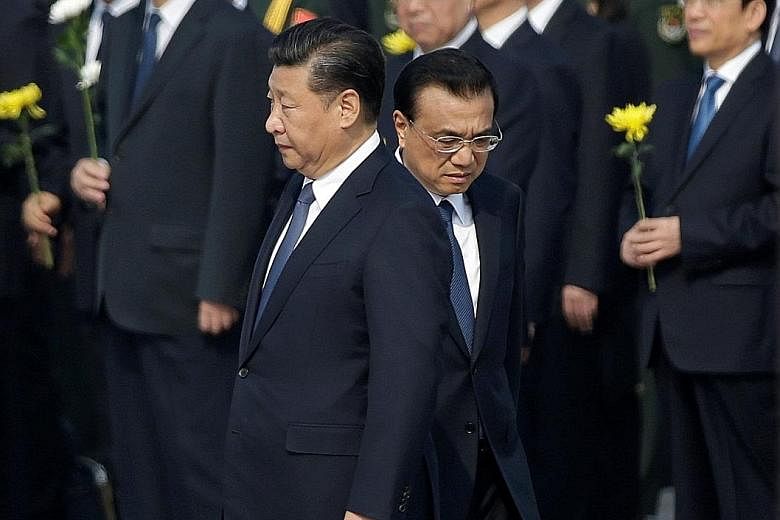BEIJING • Chinese President Xi Jinping appears prepared to defy the Communist Party's established script for transferring power and delay the designation of his successor until after a party congress next year, unsettling the party elite and stirring speculation that he wants to prolong his tenure.
The delay would buy Mr Xi more time to promote and test favoured candidates, and prevent his influence from ebbing away to a leader-in-waiting, experts and political insiders said.
But the price could be years of friction while a pack of aspiring cadres vie for the top job, as well as unnerving uncertainty over whether Mr Xi wants to stay in power beyond the usual two terms as party leader.
Although Mr Xi's decision will not be known until late next year, the suggestion that he intends to break with precedent and begin his second term without a probable successor is magnifying uncertainties about who will rise and fall in the expected shake-up, including questions about the fate of Premier Li Keqiang.
Some officials and analysts are already saying Mr Xi wants to shunt Mr Li into a lesser job.
There are whispers that Mr Xi wants to raise the informal retirement age of 68 for the powerful Politburo Standing Committee so Mr Wang Qishan, the powerful head of the party's anti-corruption agency, can stay on, possibly to replace Mr Li. Mr Wang will be 69 by the time of the next congress, but changing the retirement age for political expediency is not unheard of. It was 70 before former president Jiang Zemin lowered it so he could force out a political rival in 2002.
"It's a very delicate issue," said a member of the party establishment who regularly speaks with senior officials, speaking on condition of anonymity. "I don't think Xi wants to decide until the people he favours have more experience, more testing."
In interviews, three other party insiders close to senior officials and their families said Mr Xi appeared likely to delay picking a successor.
Two terms as party leader has evolved as the standard since the 1990s, and an heir apparent is usually clear by the start of the second.
The selection requires a consensus of the party elite, the product of behind-the-scenes wrangling.
The previous two presidents had to accept successors who were not their picks.
Delaying the choice of a successor would allow time for Mr Xi's favourites to prove their ability and loyalty, experts said. They could then allow Mr Xi to continue to wield power behind the scenes after he retires. The Constitution requires that he retire after two terms as president in 2022, but there is no limit on the more powerful job - general secretary of the party.
But some experts said the risk of elite infighting, as well as demands from other senior officials and retired leaders, could still force Mr Xi to signal his successor next year.
"Even the amount of consolidation of power so far may have raised hackles," said Ms Susan Shirk, chairman of the 21st Century China Program at the University of California, San Diego. "I don't think Xi will want to further raise alarms about Putinesque intentions."
NYTIMES

